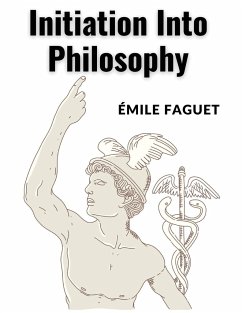The aim of philosophy is to seek the explanation of all things: the quest is for the first causes of everything, and also how all things are, and finally why, with what design, with a view to what, things are. That is why, taking "principle" in all the senses of the word, it has been called the science of first principles. Philosophy has always existed. Religions-all religions-are philosophies. They are indeed the most complete. But, apart from religions, men have sought the causes and principles of everything and endeavoured to acquire general ideas. These researches apart from religious dogmas in pagan antiquity are the only ones with which we are here to be concerned. Faguet was born at La Roche-sur-Yon, Vendée, and educated at the École normale supérieure in Paris. After teaching for some time in La Rochelle and Bordeaux, he returned to Paris to act as assistant professor of poetry in the university. Faguet became professor in 1897. He was elected to the Académie française in 1900, and received the ribbon of the Légion d'honneur in the next year. Faguet acted as dramatic critic to the Soleil; from 1892 he was literary critic to the Revue Bleue; and in 1896 took the place of Jules Lemaître on the Journal des débats. Faguet died in Paris, aged 68.
Hinweis: Dieser Artikel kann nur an eine deutsche Lieferadresse ausgeliefert werden.
Hinweis: Dieser Artikel kann nur an eine deutsche Lieferadresse ausgeliefert werden.








